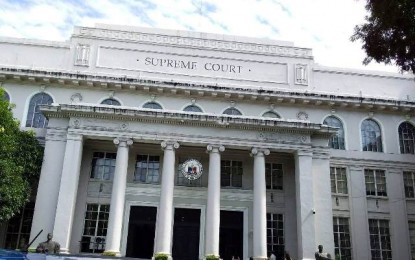
MANILA -- The Supreme Court (SC) has imposed fines on two Shari’a Circuit Court judges for their acts which cast doubts on the 2014 Sharia Bar Examinations.
In a statement Friday, the high court said it had issued a 13-page resolution promulgated on July 24, through the SC's Third Division which found Judge Kaudri L. Jainul, appointed Chairperson of the Board of Examiners, and Judge Samanodden L. Ampaso the designated translator of the 2014 Sharia Bar, guilty of conduct unbecoming of a judge and ordered them to each pay a fine of PHP10,000.
Jainul of the Sharia Circuit Court, Isabela City, Basilan and Ampaso of the Sharia Circuit Court, Tamparan, Lanao del Sur were also sanctioned "with a stern warning that a repetition of the same or similar acts shall be dealt with more severely".
The SC concurred with the findings of the Office Court Administrator (OCA) that there is no concrete proof that there was a leakage of questions during the 2014 Shari’a Bar examinations.
It held that the evidence at hand readily points to the appearance of impropriety caused by Ampaso’s designation as the translator of the examination questions.
“Although no harm was actually inflicted on the Shari’a Bar examinations by such designation, it is the impression of impropriety that it created that casts a rather bleak picture of undue preference on the image of the Judiciary. [N]o matter how miniscule such appearance of impropriety is, the Court is duty-bound to forever maintain an untarnished image as the last bastion of democratic society where pure justice is expected and dispensed,” the SC ruled.
The SC said the OCA was justified in not giving credence and weight to Jainul’s contention that he had no knowledge that Ampaso had relatives who would be taking the exams.
Ampaso’s three children took the same Sharia Bar Examinations where he was appointed as translator.
“The fact remains that Judge Ampaso had full access to the questions when he translated the questions from English to Arabic two days before the first week of the examination,” the High Court said.
It also noted that Ampaso was billeted at a hotel located only a few kilometers away from where his children stayed.
Citing Canon 4 of the New Code of Judicial Conduct for the Philippine Judiciary which requires judges to exemplify propriety at all times, the Court held that Judges Jainul and Ampaso failed to exercise caution and prudence in their actions as expected of them as judges not only in the performance of their judicial duties but in their professional and private activities as well.
The Court, however, ruled that the judges could neither be charged with a graver offense nor severely punished because at the time the controversy took place, there was no sufficient procedures or guidelines yet by which the National Commission on Muslim Filipinos (NCMF) officials, the examiners, the translator, and the Office of the Bar Confidant could have been properly guided in preparing and administering the Sharia Bar Examinations.
The SC pointed out that “the only silver lining” to this incident, lest similar incident occur in the future, was that the Court was constrained to draft the Rules for the Special Shari’a Bar Examinations which was prepared by the Committee and approved by the Court En Banc (Bar Matter No. 2716, July 14, 2015).
The said rules now govern all succeeding Shari’a Bar Examinations and have accorded the exams even greater credibility and assured Muslims that only the most qualified and competent individuals will be eligible to join the pool of Sharia Counsellors, allowed to practice, and be appointed in any of the Sharia Courts. (PNA)
